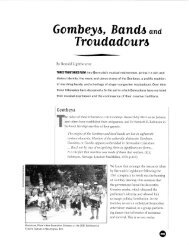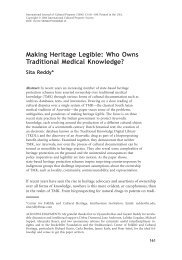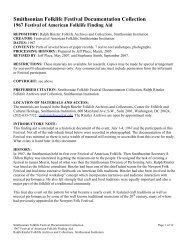Fall 2005 - Smithsonian Center for Folklife and Cultural Heritage
Fall 2005 - Smithsonian Center for Folklife and Cultural Heritage
Fall 2005 - Smithsonian Center for Folklife and Cultural Heritage
Create successful ePaper yourself
Turn your PDF publications into a flip-book with our unique Google optimized e-Paper software.
C U L T U R A L H E R I T A G E P O L I C Y<br />
In anticipation of the vote on UNESCO’s Convention on the Protection<br />
of the Diversity of <strong>Cultural</strong> Contents <strong>and</strong> Artistic Expressions, two<br />
members of the <strong>Center</strong> staff reflected on the Convention’s purpose, its<br />
definition of cultural diversity, <strong>and</strong> its implications <strong>for</strong> cultural policy.<br />
UNESCO, the United Nations Education, Scientific, <strong>and</strong> <strong>Cultural</strong><br />
Organization, voted overwhelmingly on October 17 to adopt the new<br />
Convention despite the strong objection of the United States government<br />
(the vote was 148 in favor <strong>and</strong> 2 against, with 4 abstentions).<br />
Real-<strong>Cultural</strong>-Politik: A New World<br />
Is Possible If We Imagine It So<br />
b y J A M E S E A R LY, D I R E C TO R , C U LT U R A L H E R I TAG E P O L I C Y<br />
Now that the first stage of the UNESCO<br />
Convention <strong>for</strong> the protection of cultural expressions is<br />
concluded, U.S. arts <strong>and</strong> cultural organizations should<br />
step back <strong>and</strong> review what has developed <strong>and</strong> why, in order<br />
to prepare <strong>for</strong> constructive engagement in the next round<br />
of global cultural policy discourse <strong>and</strong> negotiation.<br />
UNESCO’s Constitutional principle, “preserving the<br />
fruitful diversity of cultures,” <strong>and</strong> its obligation “to recommend<br />
such international agreements as may be necessary to promote the free<br />
flow of ideas <strong>and</strong> images by word <strong>and</strong> image” establish historical<br />
context <strong>for</strong> new cultural regulatory policy <strong>for</strong> promotion<br />
of the diversity of cultural expressions. The 1998<br />
Intergovernmental Conference on <strong>Cultural</strong> Policies <strong>for</strong><br />
Development (Stockholm, Sweden) stated a Commitment<br />
to Pluralism <strong>and</strong> emphasized that plurality occurs in the context of<br />
increasing economic <strong>and</strong> cultural globalization, which leads… to a homogenization.<br />
Consequently, in response to the perceived threat<br />
of global market homogenization to the free flow of ideas<br />
<strong>and</strong> images from culturally diverse sources within <strong>and</strong><br />
among nations, UNESCO adopted a Universal Declaration<br />
on <strong>Cultural</strong> Diversity <strong>and</strong> an Action Plan (2001), obligating<br />
States in an ethical commitment that <strong>for</strong> the first time<br />
recognizes cultural diversity as “the common heritage of<br />
humanity,” <strong>and</strong> a means of “humanizing” globalization.<br />
Concerns about the deleterious effects of globalization<br />
became so grave that many UNESCO members<br />
decided that the philosophical Declaration of<br />
2001 needed to be rein<strong>for</strong>ced with a legally binding<br />
Convention. The UNESCO Convention thus reflects a<br />
real-cultural-politik struggle in the context of neoliberal<br />
economic philosophy <strong>and</strong> policies that impede government<br />
intervention in the economy <strong>and</strong> social <strong>and</strong> cultural<br />
life. The Convention attempts to counterbalance the<br />
dominant role <strong>and</strong> negative consequences of World Trade<br />
Organization (WTO) policy that promotes deregulation,<br />
privatization, <strong>and</strong> monocultural consumerism detrimental<br />
to local <strong>and</strong> national cultures (imaginations, languages,<br />
identities, aesthetic <strong>and</strong> artistic traditions) within the<br />
Commons of developed <strong>and</strong> underdeveloped nations.<br />
Contestation over a new cultural diversity governance paradigm<br />
sets a cultural approach to the market in opposition<br />
to a market approach to culture.<br />
Due to the pressures <strong>and</strong> compromises exerted among<br />
nations engaged in realpolitik, the Convention is disappointingly<br />
weak. Regrettably the Convention fails to<br />
articulate the import of cultural diversity to spiritual <strong>and</strong><br />
material wellbeing, <strong>and</strong> the need to promote <strong>and</strong> evaluate<br />
the quality of life using non-market registers.<br />
However, despite serious shortcomings, important<br />
principles, concepts, policies, <strong>and</strong> action plans that mark<br />
a turning point <strong>for</strong> protection <strong>and</strong> promotion of cultural<br />
diversity have been <strong>for</strong>mally advanced <strong>and</strong> institutionalized<br />
by progressive citizen-artists-cultural workers<br />
<strong>and</strong> cultural ministers. The International Network <strong>for</strong><br />
<strong>Cultural</strong> Policy (Ministers of Culture) <strong>and</strong> civil society<br />
arts <strong>and</strong> culture organizations like the International<br />
Network <strong>for</strong> <strong>Cultural</strong> Diversity <strong>and</strong> the International<br />
Liaison Committee of the Coalitions <strong>for</strong> <strong>Cultural</strong><br />
Diversity are among the important actors who have<br />
launched a global real-cultural-politik that posits culture<br />
as the goal of development <strong>and</strong> challenges the sway of fundamentalist<br />
market principles.<br />
Section III Article 4-Definition: For the purpose of this<br />
Convention, it is understood that cultural diversity refers to the manifold<br />
ways in which the cultures of groups <strong>and</strong> societies find expression. These<br />
expressions are passed on within <strong>and</strong> among groups <strong>and</strong> societies. <strong>Cultural</strong><br />
diversity is made manifest not only through the varied ways in which the<br />
cultural heritage of humanity is expressed, augmented <strong>and</strong> transmitted<br />
through the variety of cultural expressions but also through diverse modes<br />
of artistic creation, production, dissemination, distribution <strong>and</strong> enjoyment,<br />
whatever the means <strong>and</strong> technologies used. (my underline)<br />
Although the Convention defines cultural diversity in<br />
broad anthropological <strong>and</strong> artistic-expressive terms <strong>and</strong><br />
employs trade terminology, the main policy motivation <strong>and</strong><br />
scope of particularly intense contention among UNESCO<br />
Member States is the expansive, defining reach <strong>and</strong> ownership<br />
concentration of media technology <strong>and</strong> the consequent<br />
potential <strong>for</strong> control by media-rich States <strong>and</strong> monocultural<br />
corporate entities over values, ideals, symbolic representation,<br />
<strong>and</strong> market share. A contending paradigm has been<br />
established in real-cultural-politik that asserts that enrichment<br />
of cultural diversity should be the end product of<br />
development <strong>and</strong> not a mere instrumentation or commodity<br />
like other goods <strong>and</strong> services, <strong>and</strong> that States thus have the<br />
right to maintain or adopt cultural policies <strong>and</strong> appropriate<br />
measures <strong>for</strong> the protection <strong>and</strong> promotion of cultural<br />
expressions. Assistance to developing countries is proposed<br />
as a “cardinal principle”—<strong>and</strong> should be extended to include<br />
“underdeveloped,” <strong>and</strong> “developing communities” in all<br />
countries. The most contested clause <strong>and</strong> defining issue of<br />
future debate <strong>and</strong> negotiation deals with the authority of this<br />
Convention over other treaties bound by the commercial<br />
orthodoxy of the World Trade Organization.<br />
{ 11 }<br />
F A L L 2 0 0 5









